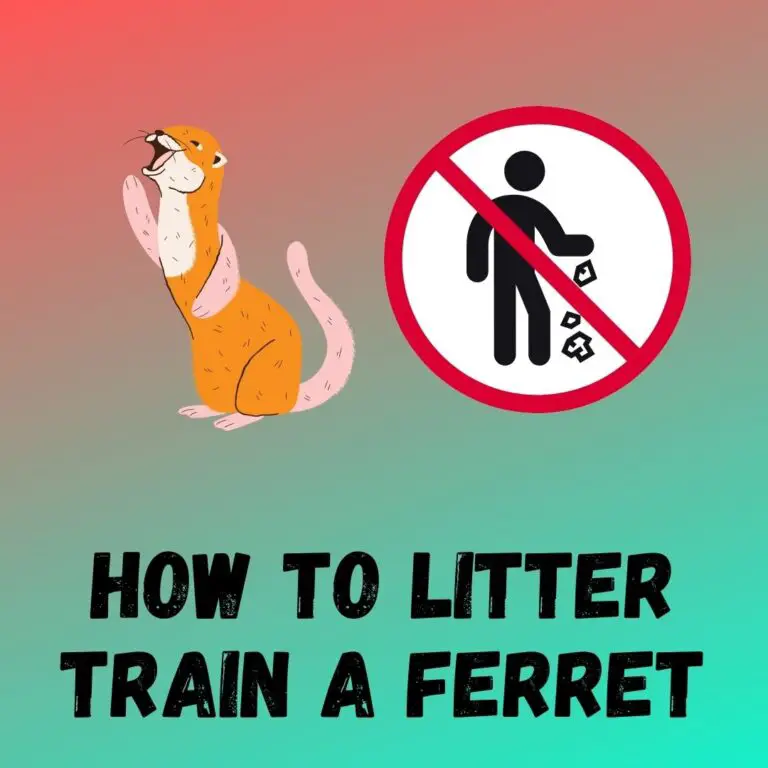
Understanding the reasons behind ferret biting
When it comes to owning a ferret, it’s important to understand why they may bite. Ferrets can be affectionate and playful pets, but they also have natural instincts that can lead to biting behavior. In order to address and stop this behavior, it’s crucial to understand the reasons behind it.
- Fear and Anxiety: Like any other animal, ferrets can become scared or anxious in certain situations. If they feel threatened or overwhelmed, they may resort to biting as a means of self-defense. It’s important to create a calm and secure environment for your ferret to minimize their fear and reduce the likelihood of biting.
- Teething: Just like puppies, ferrets go through a teething phase. During this time, their gums can become irritated and they may bite as a way to alleviate the discomfort. Providing appropriate chew toys and ensuring their teeth are healthy can help redirect their biting behavior.
- Playful Behavior: Ferrets are naturally curious and love to play. Sometimes, their biting behavior is simply a part of their playfulness. They may nip or bite while engaging with you or other ferrets. Teaching them appropriate play behavior and providing them with plenty of toys can help redirect their biting tendencies.
- Lack of Socialization: Proper socialization is essential for ferrets. If they are not exposed to different people, animals, and environments from a young age, they may become fearful or uncomfortable, leading to biting behavior. Gradually exposing them to new experiences and providing positive reinforcement can help reduce their biting tendencies.
- Medical Issues: In some cases, biting may be a sign of an underlying medical issue. Pain, discomfort, or illness can cause ferrets to become irritable and more prone to biting. If you notice any changes in your ferret’s behavior, it’s important to consult a veterinarian to rule out any medical conditions.
Understanding the reasons behind ferret biting is the first step in effectively addressing and stopping this behavior. By creating a safe and comfortable environment, providing appropriate chew toys, encouraging proper play behavior, socializing your ferret, and addressing any potential medical issues, you can help your ferret overcome their biting tendencies and enjoy a happy and healthy life.
Creating a safe and comfortable environment for your ferret
When it comes to stopping a ferret from biting, one of the key factors to consider is the environment in which they live. By creating a safe and comfortable space for your ferret, you can help alleviate any anxiety or fear that may trigger their biting behavior.
Here are some essential tips on how to create a suitable environment for your furry friend:
1. Provide a secure and spacious cage: Ferrets are naturally curious and active animals, so it’s important to provide them with a cage that allows for ample exploration and play. Make sure the cage is escape-proof and has plenty of space for your ferret to move around comfortably.
2. Offer hiding spots and cozy bedding: Ferrets need their own private space where they can retreat when they feel overwhelmed or want some alone time. Provide hiding spots such as tunnels, hammocks, or boxes, and make sure to line their cage with soft, comfortable bedding.
3. Keep the environment clean: Ferrets are meticulous animals that love cleanliness. Regularly clean their cage, litter box, and any toys or accessories they interact with. A clean environment can help reduce stress and keep your ferret healthy.
4. Minimize loud noises and sudden movements: Ferrets have sensitive hearing and can be easily startled by loud noises or sudden movements. Try to create a calm and quiet environment for your ferret, especially during their playtime or when they’re resting.
5. Provide a balanced diet and fresh water: A healthy diet is essential for a well-behaved ferret. Offer a balanced diet that includes high-quality ferret food, fresh water, and occasional treats. Providing them with the right nutrition will help keep them content and less likely to exhibit aggressive behavior.
Remember, creating a safe and comfortable environment for your ferret is just one piece of the puzzle when it comes to stopping biting behavior. It’s important to address any underlying issues and provide proper training and socialization for your furry friend. By following these tips, you can create a nurturing environment that promotes a happy and well-behaved ferret.
Establishing trust and bonding with your ferret
When it comes to stopping your ferret from biting, establishing trust and bonding with them is crucial. By building a strong relationship, you can help alleviate any anxiety or fear that may be causing their biting behavior. Here are a few tips to help you establish trust with your furry friend:
- Spend quality time together: Dedicate regular time for play and interaction with your ferret. This will help them get used to your presence and associate you with positive experiences. Use this time to gently handle and stroke your ferret, allowing them to become familiar with your touch.
- Use positive reinforcement: Reward your ferret with treats or praise when they exhibit good behavior, such as not biting. This positive reinforcement will help them understand what behaviors are desirable and encourage them to continue behaving appropriately.
- Avoid punishment: Punishing your ferret for biting can actually worsen the problem. Ferrets do not respond well to negative reinforcement and may become more fearful or aggressive. Instead, focus on redirecting their behavior and rewarding them for not biting.
- Play gently: Engage in gentle play sessions with your ferret to help them understand appropriate play behavior. Avoid roughhousing or games that may encourage biting. If your ferret does bite during play, immediately stop the interaction and give them a timeout in a designated area.
- Be patient: Building trust takes time, especially if your ferret has had a history of biting or has not been properly socialized. Be patient with your furry friend and understand that progress will happen gradually. Consistency and positive reinforcement will go a long way in establishing trust.
Remember, every ferret is unique, and it may take some trial and error to find the techniques that work best for your pet. By investing time and effort into building a strong bond with your ferret, you can effectively stop their biting behavior and create a loving and trusting relationship.
Identifying and addressing possible health issues
As a responsible ferret owner, it’s crucial to be aware of the potential health issues that can lead to biting behavior in your furry friend. While some biting may be due to natural ferret instincts or behavioral issues, it’s important to rule out any underlying medical conditions that may be causing discomfort or pain. Here are a few health issues that could contribute to your ferret’s biting behavior and how to address them:
Dental Problems
Ferrets, like humans, can experience dental problems such as tooth decay, gum disease, and abscesses. These issues can cause considerable pain and discomfort, leading to a ferret becoming more prone to biting. If your ferret’s biting behavior is accompanied by pawing at the mouth, drooling, or difficulty eating, it’s important to consult a veterinarian who can examine your ferret’s teeth and provide appropriate treatment. Dental cleanings, extractions, or medication may be recommended to alleviate your ferret’s pain and prevent further biting.
Illness or Injury
A ferret that is not feeling well or is in pain due to an illness or injury may resort to biting as a form of defense or to communicate their discomfort. If your ferret’s biting behavior is sudden or out of character, it’s essential to check for any signs of illness or injury. Look for symptoms such as lethargy, changes in appetite, respiratory issues, limping, or any other abnormal behavior. If you suspect your ferret is unwell or has been injured, consult with a veterinarian as soon as possible. Proper diagnosis and treatment of any underlying medical conditions can help alleviate your ferret’s discomfort and reduce biting behavior.
Hormonal Changes
Sexually mature ferrets, especially unneutered males, may exhibit more aggressive and biting behavior when hormones are at play. If your ferret has not been altered, consider discussing the option of spaying or neutering with your veterinarian. This can help regulate hormonal changes and reduce aggression, including biting tendencies.
Remember, if you suspect that your ferret’s biting behavior may be due to a health issue, it’s always best to seek professional advice from a veterinarian. They have the knowledge and expertise to diagnose and address any medical conditions that may be contributing to your ferret’s biting behavior.
By addressing potential health issues, you’re taking an important step towards resolving your ferret’s biting behavior and ensuring their overall well-being.
Providing appropriate mental and physical stimulation for your ferret
One of the key factors in stopping a ferret from biting is ensuring they receive adequate mental and physical stimulation. Ferrets are highly active and curious animals, so it’s crucial to keep them engaged and provide outlets for their energy. Here are some tips on how to provide the appropriate stimulation for your ferret:
1. Daily exercise: Regular exercise is essential for keeping your ferret physically active and mentally stimulated. Set aside time each day for play sessions, either with interactive toys or by letting them explore a safe and secure area. [INSERT DATA/INFO].
2. Interactive toys: Invest in interactive toys that stimulate your ferret’s natural hunting and chasing instincts. Toys that require problem-solving, such as treat puzzles or hiding treats in different areas of their enclosure, can keep their minds sharp and provide entertainment. [INSERT DATA/INFO].
3. Hide and seek games: Ferrets love to explore and hide in small spaces. Create a game of hide and seek by hiding treats or toys throughout their play area, encouraging them to search and hunt for their rewards. This not only keeps them mentally engaged but also provides hours of entertainment. [INSERT DATA/INFO].
4. Rotation of toys: To prevent your ferret from becoming bored with their toys, rotate them regularly. This helps maintain their interest and keeps them entertained. Introduce new toys periodically to provide new experiences and challenges. [INSERT DATA/INFO].
5. Social interaction: Interacting with your ferret is vital for their mental well-being. [INSERT DATA/INFO]. Spend quality time playing, cuddling, and even teaching them tricks. The bond you create through social interaction will result in a happier and more content ferret.
By providing appropriate mental and physical stimulation for your ferret, you can help reduce biting behavior. Remember, a bored or under-stimulated ferret is more likely to engage in unwanted behaviors. With a variety of toys, regular exercise, and social interaction, you can create a stimulating environment that keeps your ferret happy and engaged.
Teaching and reinforcing bite inhibition
When it comes to dealing with ferret biting, one crucial aspect is teaching and reinforcing bite inhibition. Bite inhibition is the ability for a ferret to control the force of their bite, which is essential in reducing the risk of injury. Here are some tips in teaching and reinforcing bite inhibition in your ferret:
1. Gentle Redirecting: Whenever your ferret bites, immediately redirect their attention to a more appropriate target. For example, if they nip at your hand, gently remove your hand and present them with a chew toy or a piece of fabric they can grab onto. This helps them understand that biting humans is not acceptable behavior.
2. Yelps or High-Pitched Sounds: Ferrets have a natural instinct to avoid causing pain, and they respond to high-pitched sounds as signals to stop biting. When your ferret bites too hard, let out a sharp yelp or a high-pitched sound to mimic the sound of a littermate. This will startle them and make them realize that they need to be gentler.
3. Timeouts: If your ferret continues to bite even after redirecting or yelping, it’s important to establish clear boundaries. Whenever the biting becomes too much, gently place your ferret in a designated timeout area, such as a separate room or a playpen. This gives them time to calm down and understand that biting leads to a loss of playtime and interaction.
4. Consistency and Positive Reinforcement: Consistency is key in teaching bite inhibition. Avoid giving mixed signals by always responding to biting behavior in the same way. Additionally, praise and reward your ferret for good behavior. When they refrain from biting or show gentleness, offer treats, playtime, or verbal praise to reinforce the desired behavior.
Remember, teaching bite inhibition takes time and patience. Be consistent in your approach and provide positive reinforcement to help your ferret understand what is expected of them. By teaching proper bite inhibition, you can help ensure a safe and enjoyable interaction between you and your ferret.
Now that we’ve covered the importance of bite inhibition, let’s dive into another important aspect of addressing ferret biting behavior: the role of socialization.
Seeking professional help if necessary
If you’ve tried various methods to stop your ferret from biting and still haven’t seen any improvement, it may be time to seek professional help. Veterinarians, animal behaviorists, or experienced ferret trainers can provide valuable insights and guidance in addressing biting behaviors. Here are a few reasons why seeking professional help can be beneficial:
- Expertise: A professional will have extensive knowledge and experience in dealing with ferret behavior issues. They can accurately assess the cause behind your ferret’s biting and provide tailored advice and solutions.
- Identification of underlying medical issues: Sometimes, biting can be a symptom of an underlying health condition. A professional can conduct a thorough examination to rule out any medical causes and recommend appropriate treatment if necessary.
- Behavior modification techniques: Professionals can teach you effective behavior modification techniques that specifically target your ferret’s biting problem. They can guide you on how to modify your ferret’s behavior through positive reinforcement, redirection, and other proven methods.
- Customized training plans: No two ferrets are the same, and what works for one may not work for another. A professional can create a personalized training plan based on your ferret’s individual needs, temperament, and biting triggers.
- Ongoing support: Working with a professional allows you to receive ongoing support and guidance throughout your ferret’s behavior modification process. They can answer any questions or concerns you may have and provide reassurance during challenging periods.
Remember, seeking professional help should never be seen as a failure or a reflection of your abilities as a ferret owner. It simply demonstrates your commitment to providing the best care and addressing your ferret’s biting behavior in the most effective way possible.
By enlisting the help of a professional, you can gain valuable insights, learn effective techniques, and ultimately create a safe and harmonious relationship with your ferret.
Conclusion
Addressing and stopping ferret biting behavior requires a combination of understanding the reasons behind it and implementing effective strategies. By creating a calm and secure environment, providing appropriate chew toys, and teaching proper play behavior, you can help reduce biting incidents. Socializing your ferret and seeking professional help if necessary are also important steps.
To keep your ferret mentally stimulated, daily exercise, interactive toys, and social interaction are key. Teaching and reinforcing bite inhibition is crucial for a safe and enjoyable interaction. Redirecting their attention, using yelps or high-pitched sounds, implementing timeouts, and being consistent in your response will help teach them appropriate behavior.
Remember, teaching bite inhibition takes time and patience. Seeking professional help from veterinarians, animal behaviorists, or experienced ferret trainers can provide valuable insights and guidance. They can offer expertise, identify medical issues, and create customized training plans to address biting behavior effectively.
By following these tips and committing to providing the best care for your ferret, you can create a harmonious bond and minimize biting incidents.






